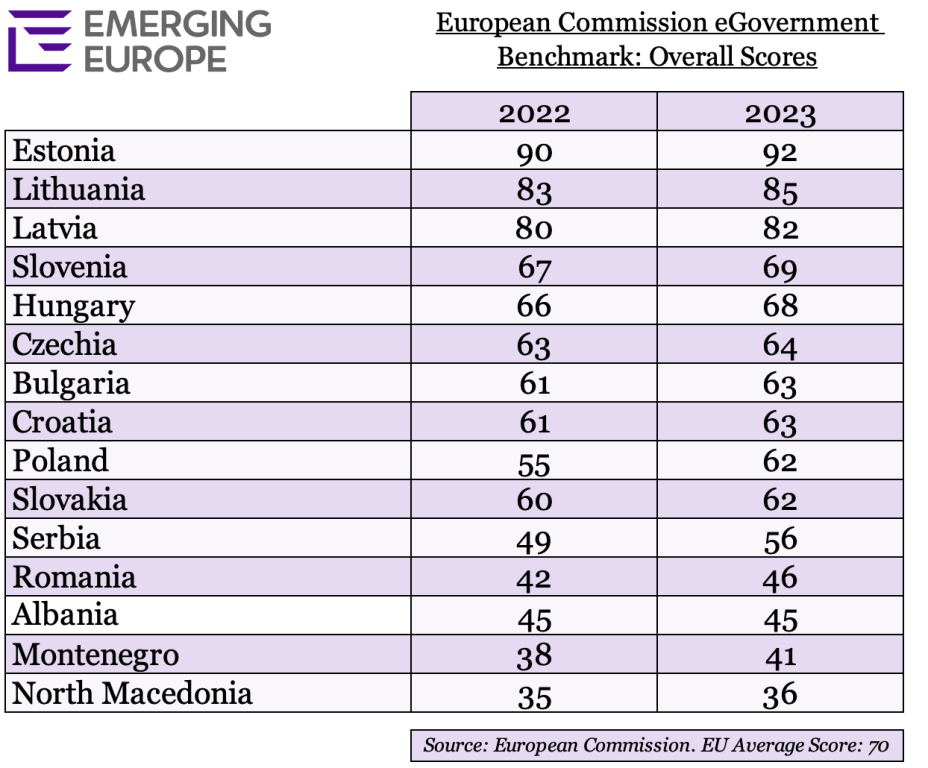Most emerging EU countries lag behind the rest of the bloc in implementing digital public services.
To what extent are government services delivered online in emerging Europe? How mobile-friendly are they? And what online support and feedback mechanisms are in place?
A major new study from the European Commission, published as part of its first annual report reviewing its Digital Decade targets, provides a comprehensive overview of progress towards achieving digital transformation to enable a more sovereign, more resilient EU and more competitive on a digital level.
The report, which is the first in an annual series, is a call to Member States for collective action to close current investment gaps, accelerate digital transformation in Europe and step up efforts to achieve the objectives of the EU political agenda. the Digital Decade (DDPP).
The DDPP entered into force in January 2023 and includes a series of targets and goals for 2030 focused on four main pillars: digital skills, digital infrastructure, digitalization of businesses, including the use of artificial intelligence (AI), and the digitalization of public services. services.
The objectives of the DDPP include 100% online accessibility to key public services and, where applicable, the possibility for EU citizens and businesses to interact online with public administrations, online access to their electronic health records and access to secure electronic identification. (eID).
A key element of the report, a reference in e-governmenthighlights progress towards the complete digitalization of public services in the 27 Member States of the European Union, but also in Iceland, Norway, Switzerland, Albania, Montenegro, North Macedonia, Serbia and Turkey .
The results show that while much of Europe’s emerging region performs well (notably the Baltic States, all of which have overall e-government implementation scores above the EU average ), some countries are falling further and further behind the EU average, notably in Romania. and the Western Balkans.
Romania, lagging behind in EU e-government
The long queues that form early in the morning in front of almost all public services in Romanian cities have long testified to the failure of the digitalization of public services. Obtaining official documents, whether a passport, ID card, driving license or even paying taxes, often requires a long queue.
Although the country has made some progress compared to 2021-2022, Romania still performs significantly below the EU average in the availability of digital public services for citizens (score of 48 against the EU average). EU of 77) and for businesses (a score of 45 compared to the EU). average of 84).

Only 24 percent of Romanian online users actively use e-government services, compared to a European average of 74 percent. A key problem is the lack of digital identity in the country, even though Romania has committed to issuing eight million digital ID cards by 2026 (around 40 percent of the population).
As efforts are made to digitally transform public services, with many projects funded under the National Recovery and Resilience Program expected to bring more services online, reduce fragmentation, improve interoperability and remove barriers bureaucratic, the report emphasizes that Romania must “implement the measures quickly and effectively, as they represent a major opportunity for the digital transformation of the government. This will have significant benefits for citizens and businesses.
Improvements are needed at all levels
Romania may be an exception, but the Commission’s report makes clear that all countries need to do more.
“We must accelerate our efforts to achieve our objectives by 2030,” says Thierry Breton, Commissioner for the Internal Market. “Now is the time to work together to place Europe at the forefront of the digital transition. This is the meaning of the recommendations that we are addressing today to the Member States.
Even Estonia, a global leader in e-government which continues to invest heavily to make its digital public services even more user-friendly and accessible to citizens and businesses, can do more, the report suggests, particularly when it comes to accessibility. health data for all (including people with disabilities) and ensuring that public service portals are accessible from mobile devices.
According to Věra Jourová, Commission Vice-President for Values and Transparency, the road to fully achieving the goals of the digital decade is still long.
“Now is the time to take all necessary steps to close the gap and ensure that the full digital transition is achieved by 2030, leaving no one behind. »
Unlike many news and information platforms, Emerging Europe is free to read and always will be. There is no paywall here. We are independent and do not affiliate with or represent any political party or commercial organization. We want the best for emerging Europe, no more, no less. Your support will help us continue to raise awareness of this magnificent region.
You can contribute here. THANKS.


